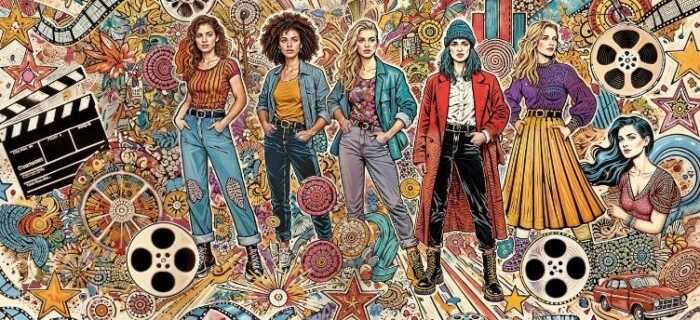Unveiling the Shadows: The Flawed Femininity of “Eternal Sunshine of the Spotless Mind”

Here we are, two decades in, and Eternal Sunshine of the Spotless Mind is still making waves—just maybe not the ones it should be. While the film continues to dazzle with its kaleidoscopic take on memory and heartbreak, it’s got a few skeletons in its surreal closet. Namely, Clementine Kruczynski. Sure, Kate Winslet brought her to life with fiery hair and even hotter takes, but let’s not pretend this character didn’t fall—hard—into the Manic Pixie Dream Girl (MPDG) pit. And that pit? It’s deep and, unfortunately, still sucking women’s narratives down with it.
If anything, the pit Eternal Sunshine dug for Clementine is emblematic of a larger issue in films that still cling to outdated gender roles under the guise of innovation. While the film impresses with its dreamlike narrative and emotional depth, it simultaneously regresses by confining Clementine to a familiar, reductive trope. Her character, for all her fiery spontaneity, exists not for herself, but for Joel—her emotional turbulence merely a palette from which he paints his self-discovery. In a film that so boldly breaks the boundaries of storytelling, it’s disheartening to see its female lead bound by the same old and tired narrative that women are there to “fix” men. And this pit isn’t just deep; it’s practically a vortex, sucking the potential complexity of female characters into a singular, stifling role. It reinforces the dangerous cultural narrative that women’s emotional expression is not about them, but about how they impact the men in their orbit—rendering them accessories to a man’s emotional toolkit rather than fully realized people.

The Eternal Problem of the Manic Pixie Dream Girl
Let’s get one thing straight—Clementine isn’t the revolutionary female lead some people once hailed her as. She’s quirky (check), spontaneous (check), and has enough personality to color Joel’s drab existence. But that’s where the problem lies: her whirlwind of vibrancy exists for him. Every impulsive hair color, every erratic outburst—Clementine is just another version of the MPDG trope, her complexities flattened into a tool to “save” Joel from his monotony. It’s like the writers went, “Let’s throw in some eccentricity, add a dash of unpredictability, and boom, there’s your perfect emotionally supporting female.”
What’s insidious about this trope is that it sells the illusion of female depth while simultaneously hollowing it out. Clementine appears to be all sharp edges and bright colors, a vibrant figure moving through a world of muted tones. Yet, every facet of her personality is aimed at drawing Joel out of his emotional stupor. Her complexity is performative—quirks for the sake of quirks—meant to disrupt his carefully controlled world, but never meant to tell a story of her own. Clementine isn’t allowed her narrative arc. Her growth, her emotional wounds, her internal life—they’re all subjugated to Joel’s transformation. The film never delves into why Clementine is the way she is, what traumas shaped her, or what dreams she holds beyond the scope of her relationship with Joel. We never get to witness her evolve independently of him.
Furthermore, her role as an MPDG speaks to a wider cinematic tradition where women, particularly women with unconventional traits, are forced into the role of the “healer” or the “catalyst” in male-centered stories. They are bright and bold, but tragically transient—their significance fades the moment their purpose has been fulfilled. By the time the credits roll, Clementine has been both literally and figuratively erased from Joel’s narrative, despite her being central to it. The idea that such vibrant female characters can be erased, forgotten, or rewritten to serve male narratives extends far beyond this film, tapping into a cultural pattern that undervalues women’s agency.
The erasure of Clementine—both literally, through the memory-wiping procedure, and metaphorically, as a character reduced to someone else’s emotional stepping stone—speaks volumes about how women’s complexity is often dismissed in favor of male-centric storytelling. By the end of the film, Clementine has been stripped of her agency, her narrative arc becomes truncated the moment her utility in Joel’s story is exhausted. Her vibrancy, once central, fades as soon as Joel’s emotional needs are met. This kind of narrative disservice isn’t just an oversight—it’s a symptom of a wider cinematic tradition that fails to acknowledge women as fully realized individuals with stories of their own. In allowing Clementine to be erased—quite literally from Joel’s mind—the film erases her from the audience’s perception as well, reinforcing the idea that women’s significance only lasts as long as they are useful to a man’s journey. The memory manipulation in the film, which could have opened a door to a deeper exploration of identity and autonomy, instead becomes a tool for perpetuating male control over female narratives, laying the groundwork for a broader discussion on gaslighting and narrative control.

Mind Games and Memory Manipulation: A Recipe for Gaslighting?
And then we have the whole memory erasure thing—a quirky plot device, sure, but one with some serious power dynamics lurking underneath. When Joel finds out Clementine erased him, he doesn’t stop to ask himself why. Instead, he leaps to erase her back, like it’s some emotional arms race. It’s a knee-jerk reaction that’s played off as heartbreak, but let’s call it what it really is: spite. Clementine’s initial choice is stripped of its nuance and turned into yet another cog in Joel’s sob story machine. And let’s not ignore the gaslighting vibes here—rewriting memories to suit your emotional comfort? Yeah, that’s a narrative-control problem on a whole new level.
But the gaslighting aspect doesn’t end there. The memory erasure procedure, in this case, acts as an extended metaphor for how relationships are often handled in male-dominated narratives. When things get complicated, uncomfortable, or too real, there’s a tendency to rewrite history—simplifying women’s emotions, reducing them to manageable pieces, or worse, eliminating them entirely. In Eternal Sunshine, the memory-erasing process lets Joel dodge accountability for his actions. By wiping out the painful parts of his relationship with Clementine, he absolves himself from confronting his shortcomings. Memory erasure here functions like a tool of control, giving Joel the power to reshape his version of events without ever having to reckon with his flaws. And the film, with its focus on Joel’s emotional turmoil, never fully addresses the ethical implications of his choice.
Clementine, by contrast, is deprived of that control. We never see the film explore her decision to erase Joel with the same emotional weight or complexity. Her choice is brushed off as whimsical, and impulsive, perpetuating the notion that she is emotionally unstable. The narrative leaves her at the mercy of Joel’s emotional narrative, never giving her the same space for self-reflection or growth. The relationship, once again, tilts in Joel’s favor—his experiences, his pain, and his needs dominate the story, while Clementine becomes a passive participant in her emotional erasure.
What’s most troubling is how Eternal Sunshine frames Joel’s decision as one of heartbreak and self-defense, while Clementine’s choice is dismissed as reckless impulsivity. Her erasure is never treated with the same gravitas—it’s portrayed as the irrational act of a woman who feels too much, while Joel’s is an understandable response to being hurt. This double standard runs throughout the film, where Joel is continually given the emotional space to process his pain, while Clementine’s inner life is brushed aside. This imbalance reinforces the idea that men’s emotional responses are somehow more valid, while women’s emotions are depicted as chaotic and in need of control. And what better way to control someone than to erase the messy parts? The film romanticizes Joel’s inability to let go, but what it’s really doing is turning toxic possessiveness into a sentimental love story—setting the stage for a deeper discussion on how the film glamorizes dysfunction under the guise of passion.

Romanticizing Toxicity: Dysfunction in Pastels
And here’s where it gets even messier: Joel and Clementine’s relationship is a hot mess, but the film romanticizes it as the kind of soul-deep connection worth fighting for. Sorry, but are we watching the same movie? Their dynamic is toxic with a capital T. Joel’s obsession with her is framed as a tragic, beautiful longing, but honestly, it’s more like he’s clinging to a woman he never fully understood or appreciated. And Clementine? She’s boxed into the “difficult woman” stereotype—the erratic, emotionally volatile foil to Joel’s steady suffering. It’s a neat little narrative that lets him be the hero in his emotional saga while she’s stuck playing the muse, her complexity reduced to how many ways she can push him out of his shell.
What’s particularly damaging about this portrayal is the way it suggests that love, even when it’s toxic, is somehow worth romanticizing. The film’s conclusion, where Joel and Clementine choose to be together again despite knowing the painful history they’ve erased, is framed as bittersweet, a testament to love’s endurance. But what’s enduring here isn’t love—it’s dysfunction. The narrative implies that the volatility of their relationship is an essential part of their connection, reinforcing the idea that true love is supposed to be difficult, exhausting, and even harmful. It’s a dangerous message that normalizes unhealthy relationship dynamics and glosses over the emotional labor required to maintain such a relationship. Clementine’s erratic behavior is framed as charming, even endearing, while Joel’s passive-aggressiveness is viewed as quiet suffering. The imbalance in how their emotional lives are portrayed creates a distorted view of what love should look like.
Moreover, the film never fully addresses the power dynamics at play in their relationship. Joel’s persistence in pursuing Clementine, even after their memories have been wiped, borders on possessiveness. He clings to the idea of Clementine as an object of desire rather than acknowledging her as a fully realized person. This framing places Clementine in the role of the elusive muse—an idealized figure who exists to inspire Joel’s emotional awakening, rather than as a partner with her own needs and complexities.
The issue becomes even more complex when we consider how Eternal Sunshine of the Spotless Mind, directed by Michel Gondry, frames this deeply flawed relationship as worth saving, as if dysfunction equals depth. It reinforces the tired trope that emotional turbulence is necessary for passion, perpetuating the idea that enduring chaos and pain is a hallmark of true love. Clementine’s unpredictability is cast as enchanting, a quirky trait that fuels Joel’s longing, while his passivity is depicted as some quiet martyrdom. The film subtly suggests that Clementine’s volatility is what gives their relationship meaning, rather than addressing it as a symptom of deeper incompatibility. This idealization of suffering in relationships blurs the line between healthy and unhealthy dynamics, leaving us with a distorted blueprint for what love is supposed to be.
In contrast, Her, directed by Spike Jonze, offers an exploration of loneliness and emotional disconnection through a different lens. Jonze reportedly created Her as a response to Lost in Translation, a film directed by his ex-wife, Sofia Coppola, which also delves into themes of isolation and emotional longing. Much like Eternal Sunshine, Her centers on a man grappling with loneliness, with the female figure—in this case, an AI named Samantha, voiced by Scarlett Johansson—serving as a muse for his growth. The parallels between Her and Eternal Sunshine of the Spotless Mind are striking, even with a decade separating their releases. Both films delve into male-centric emotional journeys, framed through the perspectives of idealized, often unattainable women. However, Jonze’s film reflects a personal response to Coppola’s portrayal of emotional disconnection, highlighting how even deeply personal films can still reduce women to emotional stepping stones in male narratives. This recurring dialogue between the films highlights how deeply entrenched male-centric storytelling patterns are in cinema, even when they arise from a director’s efforts to confront his own emotional history.

Not Just an Eternal Problem: Spike Jonze’s Her and the Issue with Male-Centric Narratives
Let’s talk about Her. A beloved film by Spike Jonze, it presents another problematic portrayal of women. Samantha exists to fulfill the emotional needs of Theodore (Joaquin Phoenix), much like Clementine does for Joel. Yet with Samantha, it’s even more blatant—she’s literally created to cater to Theodore’s emotional growth. This time, the MPDG isn’t just a trope; she’s a fully manufactured being, designed for male consumption. Both Her and Eternal Sunshine are guilty of boxing in their female characters, rendering them plot devices for men’s journeys.
This pattern across both films points to a broader trend in cinema where women’s autonomy is sacrificed for the sake of male emotional fulfillment. In Her, Samantha’s complexity is limited to how she shapes Theodore’s emotional journey. Although she doesn’t have a physical body, she embodies the ultimate Manic Pixie Dream Girl: disembodied, unattainable, and existing solely to help a man explore his desires. By constructing women as mere catalysts in men’s stories, both films perpetuate the notion that women’s emotional lives are secondary, designed to serve men’s narratives rather than their own.
The parallels between Eternal Sunshine and Her are striking, revealing a troubling trend in how female characters are portrayed in modern cinema. In Her, Samantha functions as an extension of Theodore’s emotional landscape—an idealized figure who molds herself to meet his needs, lacking independent desires or complexities. This stands in stark contrast to the potential of technology to facilitate an exploration of individuality; instead, it reinforces a narrative that reduces women to tools for male emotional discovery. This disembodied manifestation of the MPDG trope invites audiences to grapple with the implications of an artificial being designed purely for male consumption, raising questions about the ethical ramifications of such portrayals.
Both films serve as cultural commentaries that reveal how deeply entrenched the notion of women as emotional support systems for men remains, echoing a broader societal tendency to prioritize male narratives. By depicting women—whether human or artificial—as mere catalysts in men’s stories, these films diminish the depth of female characters while perpetuating the harmful belief that women’s emotional lives are secondary to men’s journeys. The connection between these two films serves as a clarion call for change in the industry, demanding narratives that allow women to step beyond the confines of male-centric storytelling and reclaim their complexity, agency, and independence.

Time to Rewrite: Making Room for Female Complexity
As we celebrate Eternal Sunshine hitting the big two-oh, it’s time we hold the film accountable. Sure, it’s visually stunning, and its exploration of memory and love is inventive, but that doesn’t mean we get to ignore its gender dynamics. Clementine’s role as an MPDG, the romanticization of toxic love, and the ethical muddiness of memory erasure all reflect a broader issue: women in cinema are too often denied their full agency.
We can—and should—demand more. Complex female characters who exist on their terms, who aren’t just quirky additions to a man’s emotional toolbox. So, as we look back on Eternal Sunshine, let’s recognize it for what it is: a beautiful, flawed, and deeply problematic film. And maybe, just maybe, we’ll stop erasing women’s stories, both on-screen and off.

As we wrap up this deep dive into Eternal Sunshine of the Spotless Mind, it’s clear that we’re overdue for a cinematic renaissance—one where women are more than just muses and emotional support systems. It’s high time we reclaim the narrative, allowing female characters to leap off the screen with their complexities and stories, rather than being confined to the sidelines of male-centric plots. After all, if we can rewrite memories in films, surely we can rewrite narratives! So let’s turn the spotlight on women’s stories and let them shine—because every tale deserves to be told, and every character deserves to be more than just a fleeting figment of someone else’s imagination. It’s time to stop hitting delete on female narratives and start celebrating the vibrant, messy, and wonderfully complex stories women have to share.
What do you think? Leave a comment.











Saw this film just yesterady, again. The imbalance in their emotional arcs bothers me more with each rewatch.
Really good read. Romanticizing dysfunction, as you say, is the biggest issue here.
Clementine begins as a MPDG but subverts it by challenging Joel. Don’t you think?
As I made it clear in the article, the answer is no.
Love is a beautiful mess of emotions and thank goodness for it. My life has been interesting, but thinking back on the alternative endings for me, doesn’t make me want to rewind or erase. I am very happy looking forward into a slightly alternative future.
Access to technology and thoughtlessness (and money, of course) allow anybody to rewind and erase if they want, preventing them to the reflection that only time and experience provide.
One thing I always thought about this film is that the ending is not hopeful or romantic. The story ends with the two lovers meeting again, and there is an implication that they will hook up together, but this is not a happy ending. It is actually quite dark because the audience already knows that the two characters drifted apart, and their meeting again means they are destined to repeat history.
It is an ironic ending, that even after all the effort of erasing their memories, they will end up experiencing the same thing again, which underscores the main theme of the movie. I think the audience is supposed to be alarmed knowing that these two characters made so much effort to get away fr on each other and now here they are, unknowingly about to cause each other the same misery. It is a moment of recognition or romantic spark for them, because they have no memory of the past, but for the audience, it is like seeing the beginning of a disaster.
She was always my favorite character because she felt so alive, but now I see how clementine depth is never fully explored.
Clementine felt real to me, and her imperfections are part of what makes the story resonate.
I think Clementine is awesome, and it makes me sad that people call her a ‘trope.’ She’s strong and emotional and doesn’t care what people think, and that’s really inspiring to me.
I don’t care about all this trope stuff. The movie made me cry and think about my ex, so it did something right. Not every movie has to be perfect to matter.
This film reflects early 2000s indie filmmaking’s tendency to favor emotionally stunted male protagonists.
Yes. Outdated gender dynamics.
I think Gondry wanted to explore how memory shapes identity and not necessarily gender roles. But I agree, Clementine deserved more depth.
I watched this with my wife when it first came out twenty years ago. It resonated so much that we had Beck’s song from it played at our wedding.
We watched it again recently after being separated for a year but still living in the same house with our teenage kids. It was like watching a completely different film. The movie was harrowing this time, and resonated on a whole new level. We missed the true breakup pain in the first viewing. We saw only love. The second watching tore us to pieces. We saw our marriage break-up. The hurt. The distrust. The confusion. The different personalities at play. One film was a love story. The other a story of heartbreak. We both struggled to get through it. The pain was overwhelming. The two viewing experiences are something I will never forget and will, in fact, cherish. My admiration for Charlie Kaufman was already sky high, but it grew further. He skewered my heart twice… in two different eras of life, in two different stages of the same relationship, all with the same movie.
I would hope that maybe some understanding came from the second viewing and perhaps a reconciliation?
I never thought of Clementine as a Manic Pixie Dream Girl until now, and honestly, it’s hard to unsee. Could her story have been as rich as Joel’s if the focus shifted a bit?
It’s frustrating how even in movies that push narrative boundaries, female characters get sidelined.
Clementine fits the MPDG mold, but doesn’t the film also critique Joel’s perspective?
One of my favourite films. Each time you watch it it’s like looking through a prism – you see different things and gain new perspectives depending on what life stage you’re at. Has there ever been a more perfect title for a film? Borrowed from Pope’s poem, it describes perfectly the blank canvas that exists for a brief moment in time when we first enter romantic relationships – a joyous state of mind untarnished by the inevitable bad times you go through together that can sometimes be quite painful and hard for our memories to leave in the past. Film making at its best.
Watching this film helped me to get over my first proper boyfriend. Even at a few years after we split up hadn’t really emotionally moved on from it, seeing Eternal Sunshine and how every part of a relationship (successes and failures) helps us to learn, at last helped me to heal. I also won a copy of the DVD in a New Statesman competition!
It has the same issues found in films like Garden State and Lost in Translation. The female character exists primarily to inspire or challenge the male lead.
It feels like a missed opportunity.
I saw this at the cinema when it came out, and then had a week of my mind filled with it. I could not stop thinking about it, and went back to the cinema the following weekend to watch it all again. One of my all time favourite films, it is brilliant in every detail and cast and script.
Spot on about the problematic dynamics! Films like Eternal Sunshine and Her show how much we need a shift. Pretty exhausting seeing women written as catalysts for men’s growth.
Why not explore their complexities in their own right?
I’m not sure I agree that the film romanticizes toxicity. Couldn’t it be showing us the pain of flawed relationships, and not endorsing them?
It’s more bittersweet than celebratory.
Joel and Clementine’s relationship is toxic, yes, but isn’t that the point?
I get the criticism, but I see Joel and Clementine’s choice to try again as hopeful. Love isn’t perfect, and they both make mistakes. Maybe that’s the point of it all? In this movie, and beyond. 😀
It’s great film-making but jarring for people who’ve been in a relationship with somebody with Borderline Personality Disorder. It’s ultimately apologia for cluster-B abuse, and contains the horrifying implication that the Jim Carrey character has been through this cycle with Clementine many times before and never learns that he’d be better off without her and her destructive ways.
The movie is perfect.
Eternal Sunshine, The Truman Show and The Majestic are the three reasons I can think about Jim Carrey without shuddering. The ‘dramatically toned down’ version of him is magnificent.
The Cable Guy is his Blue Velvet
Regardless of the pain generated by my divorce, I take huge comfort from the fact that it was never as romantically painful as this film.
Isn’t divorce supposed to be a happy, liberating experience? Why would it cause pain? I never could understand that?
When I first saw this, I was 17 years old. It was beautiful storytelling, but it somehow felt problematic — though I couldn’t quite put my finger on why. It took me almost 10 years of my own experiences with men who tried to erase me — literally, to erase my personality in order to make me more ‘pixie-like’ — to fully understand everything described in this article. Thank you for such a bold and insightful take on a masterpiece that portrays a problematic relationship. I only wish I had read this in my early twenties
Samantha’s lack of agency does indeed mirrors Clementine’s in many ways.
I wish we could see (GOOD) stories that celebrate healthy relationships without sacrificing complexity.
I love Eternal Sunshine, but it’s clear it’s a product of its time. The industry has grown since then.
Clementine is definitely a MPDG, but she’s way more layered than, say, Summer in 500 Days of Summer. Still, I wish we saw her as more than just Joel’s muse.
Clementine reminds me of me. Like, she’s messy and changes her hair a lot, but that’s just how some ppl r. Maybe her story isn’t perfect, but she feels real to me.
Joel is so boring!
I saw this when it came out, and it blew my mind. Sure, Clementine could have been fleshed out more, but the film captured the heartbreak of love in a way no other movie did.
Yup. Look at La La Land, Annie Hall, even Her. Why are women’s stories often secondary?
Absolutely loved this movie when it came out, I haven’t thought about it in ages, must give it another watch.
It certainly changed my perception of Jim Carrey, he’s a much more versatile actor than his usual gurning, flippant, overbearing presence lets on. And I think this was the first movie I saw that shows you just how good Elijah Wood is at playing incredibly creepy weirdos.
I saw Eternal Sunshine when it came out and didn’t understand it. And I saw it again on tv and still didn’t understand it.
I got on better with other Michel Gondry and/or Charles Kaufman films such as Be Kind Rewind, The Science of Sleep, and Being John Malkovitch.
One of those films I wish I had seen on a big screen. Epics and blockbusters I can enjoy on a small screen but the films I really love I wish I had seen at cinema with the added bonus of the communal experience.
What even is a Manic Pixie Dream Girl? Clementine is just cool and does her own thing. Why does every strong woman get labeled like that?
One of the best movies of the century.
Just popped by to say HI! Excellent article as always.
This article speaks volumes a long time coming needed to be said
From the angle of Joel’s character, it seems the movie is romanticizing narcissism